
Tommy Smith, Anfield Legend
Tommy Smith, Liverpool’s legendary hard man defender and frequently skipper in the sixties and seventies, passed away today aged 74. With him went another link in the chain that Liverpool and Leeds United forged between themselves in those two decades, for most of which time they were untouchable as the two great powerhouses of English football.
Tommy was an original who became almost a cliché in that he was one of the earliest examples of the “take no prisoners” school of defending as English League football went through a grisly tough phase before and after Alf Ramsey’s World Cup triumph in 1966. In those days, a cult grew up around defenders upon whom you could rely to “kick owt that moves”; most of the top teams had at least one such. Indeed, what possibly set Leeds aside was that they were so richly served on both the constructive and destructive sides of the game. Man United’s George Best famously reminisced “All the top teams had one hard man. We had Nobby Stiles, Liverpool had Tommy Smith, and Arsenal had Peter Storey. Leeds United, by the way, had eleven of them”. That’s the kind of slightly grudging, backhanded compliment that makes a football fan’s heart swell with pride.
Tommy Smith, though, really did stand out. His appearance was almost that of a Desperate Dan in all red, the kind of man you supposed would shave with a blowtorch. Granite jawed and imposing, he struck fear into many a flash striker’s heart, and he neither gave nor asked any quarter when battle was joined. His catchphrase, issued in a Scouse growl whenever he was annoyed by opposition antics, was “Do that again, and I’ll snap yer back”. It was probably safer to assume that Tommy meant it, and behave accordingly.
On one famous occasion, though, when Leeds United visited Anfield, Allan “Sniffer” Clarke had the temerity to upend Tommy, leaving him dazed on the turf. Blinking and shaking his head, Smith enquired of his concerned Liverpool colleagues, in the manner of a road accident victim asking if anyone got the car’s number, “Who did that? I’ll snap his back!” A Liverpool team-mate promptly replied, “It was Clarke. And he’s just gone and kicked Emlyn up in the air as well”. Immediately, Smith’s expression softened. It was well-known on Merseyside that Smith had no time at all for Emlyn Hughes, and that fact clearly saved Sniffer from retaliation, as the Anfield Iron just smiled and got up a little groggily, saying “Ah, let him be. I always knew that fellow Clarkey was a good lad”.
It’s one of those stories linking Bill Shankly’s Liverpool with Don Revie’s Leeds, along

Tommy and Billy, Red and White
with the Spion Kop applauding the new Champions in 1969 after Leeds United secured a 0-0 draw at Anfield to win their first title. It was typical of the mutual respect between two great northern clubs, and it was still going on in 1992 when Leeds fans applauded Liverpool off at Wembley after the Reds had been beaten 4-3 in the Charity Shield. United fans hadn’t forgotten that their third title had been confirmed when Liverpool beat Man Utd 2-0 the previous April. It was a fantastic sight to behold, confirming the enduring link between good friends and foes.
Tommy Smith epitomised this fierce but friendly rivalry, and we’re all the poorer for his loss. I’ll never forget his finest hour, powering home a header in the 1977 European Cup Final to help Liverpool become Champions of Europe for the first time. It was a goal that summed the man up: uncompromising and unstoppable, scored by a legend among legends.
Tommy Smith, Liverpool FC Legend. (5.4.45 – 12.4.19) RIP










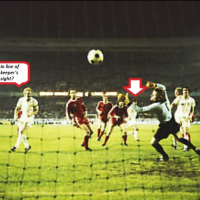


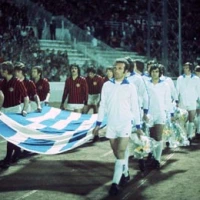



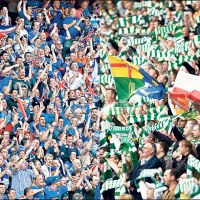
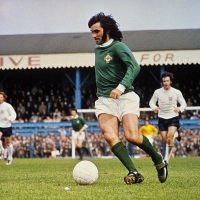
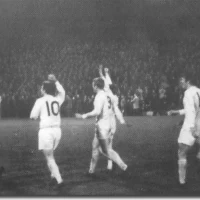








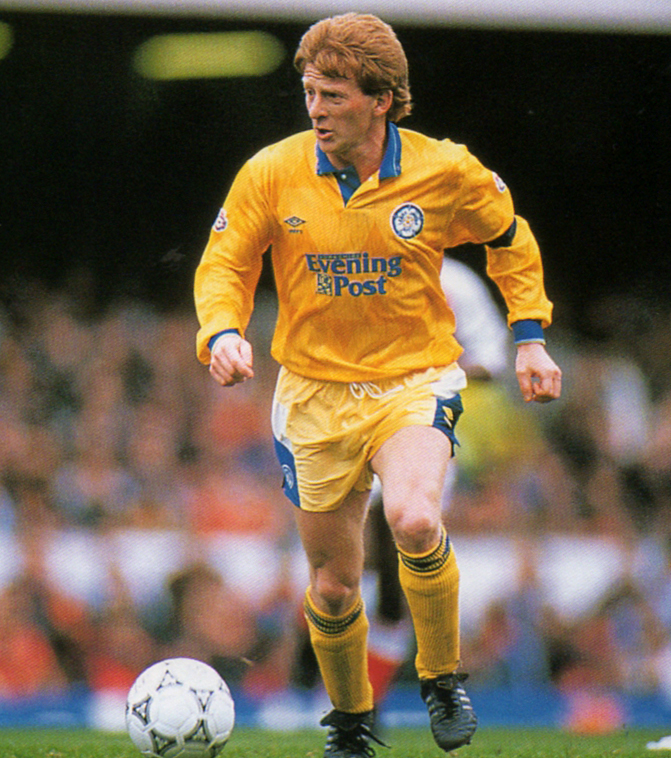

Clarke……One Nil! Hear the Late, Great David Coleman as Leeds Utd Win the Cup
David Coleman died today, and with him went another piece of our youth for all those of my generation who grew up listening to him describe Cup Finals, historical athletics achievements and so much more, all in that distinctive, much imitated voice – the voice of the seventies, surely.
This video shows highlights of the Centenary FA Cup Final at Wembley on 6th May 1972, a game whose only goal will forever be remembered in terms of Coleman’s memorably laconic description. As the ball winged in from the right, crossed by Mick Jones, Coleman simply intoned: “Clarke ……… one-nil!” There was the implication that a goal followed such a chance for Sniffer as surely as night follows day – and so it most usually did. But this was a special, historic day, the only time to date that Leeds have ever won the FA Cup, and so the commentary has a special resonance, much as Kenneth Wolstenholme‘s did for the World Cup Final of 1966. As Coleman recapped the Clarke goal at Wembley that day, he added that it was “an example of the Leeds one-two”. He usually had the right words for any occasion, and his unique voice always enhanced whatever game he was describing.
A marvellous commentator and a giant of sports coverage over many years, he even saw a new term introduced into the language courtesy of Private Eye magazine. “Colemanballs” was an affectionate reference to his occasional lapse – and it’s as much a tribute to him as anything else that will be said on this sad day of his death at the venerable age of 87.
David Coleman, 1926 – 2013 RIP A sad loss who will be much missed – thanks for the memories.
Share this:
2 Comments
Posted on 21/12/2013 in Football, Leeds United
Tagged 1972, Allan Clarke, Arsenal, commentary, cup final, David Coleman, FA Cup, icon, Leeds United, Mick Jones, Private Eye, Wembley